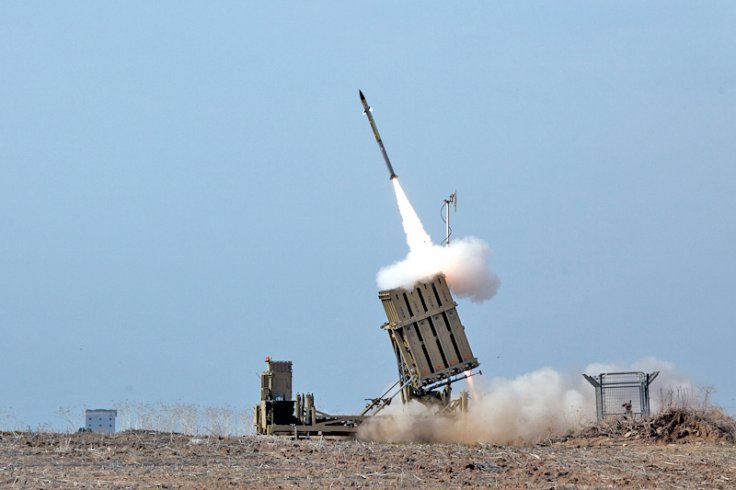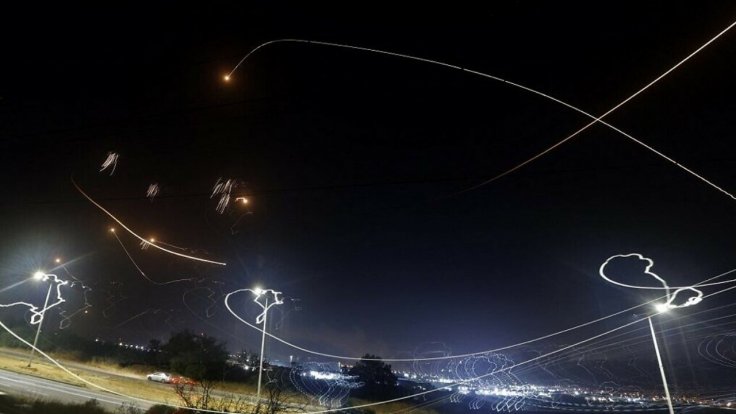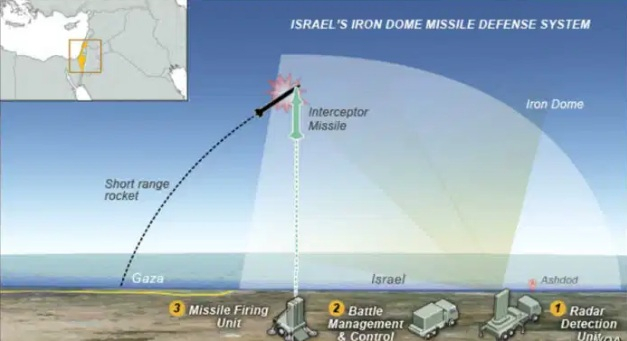The conflict between Israel and Palestine so far has seen both sides relying on air strikes, with hundreds of rockets being fired from both sides. However, despite around 500 rockets been fired on Israel, Palestine hasn't succeeded in doing much damage, while Israel's rockets have been hitting targets in Gaza to precision. And that is because of Israel's much-vaunted Iron Dome missile defense system which has been intercepting rockets to perfection.
On Tuesday evening, videos on social media showed rockets fired from Gaza being intercepted by the Israeli Iron Dome air defense system. It appeared that the rockets were hitting an invisible shield. No doubt, the Iron Dome rocket defense system has emerged as one of the biggest attractions of this deadly warfare.
What is Iron Dome?

Iron Dome is a short-range, ground-to-air, air defense system. It's is small and looks like a dome that comprises a radar and Tamir interceptor missiles that can track and neutralize any rockets or missiles aimed at Israeli targets. More importantly, it is almost invisible because of its small size. It is used for countering rockets, artillery & mortars (C-RAM) as well as aircraft, helicopters and unmanned aerial vehicles.
It is capable of being used in all weather conditions, including during the day and night. The air defense system was developed by Israeli firms Rafael Advanced Defense Systems and Israel Aerospace Industries, with financial and technical support from the United States.
The History

The story of the Iron Dome air defense system goes back to 2006 during the Israeli-Lebanon war, when the Hezbollah targeted Israel with thousands of rockets. The next year, Israel announced that its state-run Rafael Advance Systems would develop a new air defense system to protect its cities and people.
RAW FOOTAGE: This is the moment the Iron Dome intercepted a barrage of rockets over Tel Aviv and central Israel. pic.twitter.com/8jl8OTgWCl
— Israel Defense Forces (@IDF) May 11, 2021
The Iron Dome system was first deployed in March 2011 near the southern city of Beersheva, 25 miles from the Gaza Strip, and a favorite Hamas target, to combat Soviet-designed Grad rockets fired from the Palestinian territory. Israel now has 10 such batteries. Military experts say 13 Iron Dome batteries are needed to be able to defend the whole of Israeli territory, with its tense border with Syria also particularly at risk of attack.
How it Works
Iron Dome relies on a system of radar and analysis to determine whether an inbound rocket is a threat. It fires an interceptor only if the incoming rocket risks hitting a populated area or important infrastructure.

The system has three primary systems that work together to provide a shield over an area where it has been deployed. Moreover, it has detection and tracking radar that can spot any incoming threat, a battle management and weapon control system (BMC), and a missile firing unit. The BMC basically liaises between the radar and the interceptor missile. Iron Dome is capable of handling multiple threats at a time.
Precision and Success Rate
Video showing Iron Dome systems engaging rockets above the Tel Aviv area. #Gaza #Israel pic.twitter.com/KqroJj5lUi
— Global: MilitaryInfo (@Global_Mil_Info) May 12, 2021
Of the 480 rockets so far fired by Hamas, more than 200 have been shot out of the sky by the Iron Dome system, according to Israeli army. They claim that around 150 rockets fired from the Gaza Strip towards Israeli territory exploded inside the Gaza Strip.
While Rafael claims a success rate of over 90%, with more than 2,000 interceptions, experts say the success rate is over 80%. Rafael claims on its website that it can "protect deployed and maneuvering forces, as well as the Forward Operating Base (FOB) and urban areas, against a wide range of indirect and aerial threats".
WATCH as the Iron Dome Aerial Defense System intercepts rockets over southern Israel: pic.twitter.com/xUz3bMuTzz
— Israel Defense Forces (@IDF) May 12, 2021
Every time Israel launches its Tamir missile from the Iron Dome to intercept rockets from Gaza, it incurs a cost of around $95,000. Due to the higher costs, Israel usually uses them only against rockets destined for residential areas, rather than those headed for open ground. According to experts, the commissioning of the Iron Dome has changed life for many Israelis during recent conflicts, as it now allows IDF to intercept rockets fired from Gaza with more certainty.
In addition to their land-based deployment, Israel Defense Forces are looking forward to deploying the Iron Dome batteries on its naval systems. That said, some rockets fired from Gaza over the past few days have made it through and resulted in deaths in Israel due to the sustained rocket launches by Hamas.









